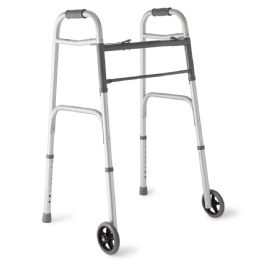
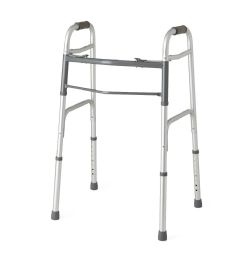
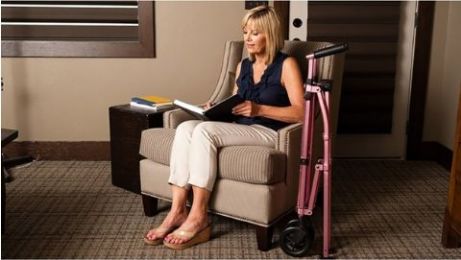
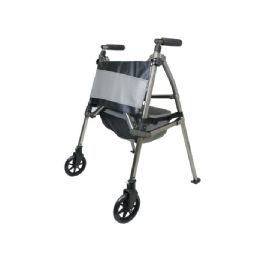
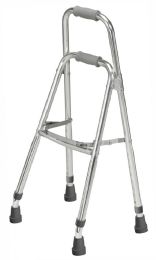
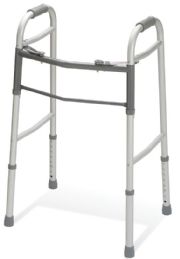
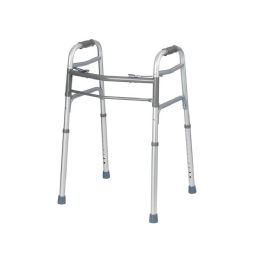



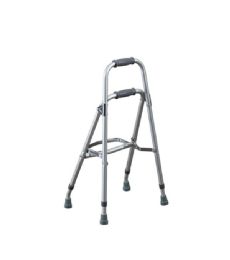
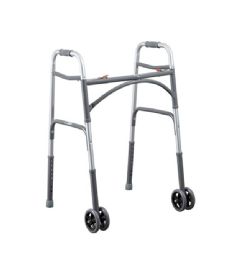

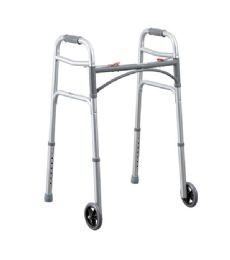
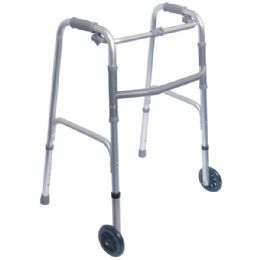
How to Choose the Best Walker
If you are at risk of falling, or have difficulty balancing while you walk, a walker can be a great device to have around, either temporarily, or as a permanent aid. Walkers are generally offered in four-wheel, two-wheel or wheelless formats, with some offering other accoutrements, such as a padded seat for users to sit upon if they need to rest. But they all generally work under the same principle; the user walks with the walker frame surrounding their sides and front, and places their hands on the top sides of the frame.
With wheelless versions, the user then picks up the walker and places it a short distance ahead, followed by the user stepping toward it, repeating the process until the destination is reached. With wheeled walkers, or those that include glides, users can push the walker ahead as opposed to picking it up between steps every time, often an easier process for those who have little arm strength. However, when stability is more of a significant concern, walkers that do not have wheels will probably be your better choice, as they are the most stable with all four legs in slide-free contact with the ground.
If you don’t have the need to lean on the walker for balance, a four-wheel walker is generally better suited for you. Two-wheel walkers do allow you to place weight on them as you ambulate, as the wheelless legs prevent the walker from moving as you’re stepping forward, but the wheeled legs afford an easier forward push of the walker.
Most medical walker devices and frames are constructed with a lightweight metal frame that makes for easy, light handling yet are durable and strong to sustain heavy-duty wear and tear. Most models will fold down for easy storage or transport. Special accessories such as rear glides, baskets or pouches to carry items, and fold-down seats can often be added to certain models. Hemi-walkers are also available for individuals who only have the use of one arm or hand. This style is even lighter than a typical walker, but provides more stability and support than a cane, typically folding down easily with the use of just one hand.
Do I Need a Walker?
As always with the purchase of medical devices, it is highly recommended to talk to your healthcare provider about what kind of walker would be best for you and your lifestyle. While walkers are generally used most by individuals who need support after surgery or injury, or for elderly or disabled individuals, there are actually a lot of varied reasons someone might benefit from using a walker device:
1) Decreased weight-bearing capabilities
If an individual is unable to stand reliably on one or both legs, a walker might be in order. Slow-healing wounds on the lower limbs and extremities, fractures, pain caused by poor circulation, arthritis and other conditions, amputations or learning to walk with a prosthesis, and hip precautions post-surgery are just a few of the reasons someone might benefit from using a walker device.
2) Decreased endurance, or fatigue
If an individual is unable to walk either short or long distances without becoming fatigued, a walker can certainly help. Shortness of breath and other respiratory conditions, frailness with aging, arthritis, systemic conditions and poor physical fitness following an extended illness or surgery are all indicative of individuals who could realize great help from using a walker device.
3) Poor, or compromised balance
If an individual is experiencing neurological conditions such as multiple sclerosis, cerebral palsy, stroke or diabetic neuropathy, the use of a walker is often recommended. Other balance issues such as dizziness, low blood pressure, inner ear imbalances and slow reflexes when the body changes position or a tendency to swaying are all good reasons to utilize a walker device.
Walkers help many people to get out and enjoy life more fully. While some individuals have stopped walking for various reasons such as fear of falling, a walker can help them to gain self-assurance and get them back into the social whirl, eliminating the social isolation that can come with lack of mobility. Standing upright and being able to ambulate safely is not only beneficial physically, but mentally as well. Many people often find that they regain independence and a sense of empowerment when they use walkers to move around again.
Rehabmart is pleased to offer a comprehensive selection of superior quality and innovatively designed walkers from such respected manufacturers like Merry Walker, TherAdapt, Romedic, SPRY, Kaye Products, IPU, Drive Medical, TFI Healthcare, Clarke Healthcare and many more.
Mike Price, OT
Rehabmart Co-Founder & CTO